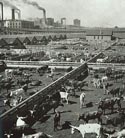Redbeard-Style (minus the vocab)
From Chapter 11 -
There is no pet quite so fascinating as a baby.
While there may be a certain truth to this, it's an interesting perspective to think of your child as a "pet." And I certainly haven't been in their position so I'm in no place to criticize, but I've noticed that they take a drastically different attitude toward children than we tend to. Other than Jurgis with his son, there is nothing precious or special about them. They are either useful or just one more annoyance.
From Chapter 12 -
They say that the best dog will turn cross if he be kept chained all the time, and it was the same with the man; he had not a thing to do all day but lie and curse his fate, and the time came when he wanted to curse everything.
Too true. We may have our basic personalities, but our circumstances and situations constantly shape us. In addressing ills we need to insist on personal responsibility, but that is nothing if we do not also try to change the social/societal conditions that the actions emerged from. There needs to be a balance of both.
From Chapter 16 -
These midnight hours were fateful ones to Jurgis; in them was the beginning of his rebellion, of his outlawry and his unbelief. He had no wit to trace back the social crime to its far sources--he could not say that it was the thing men have called "the system" that was crushing him to the earth; that it was the packers, his masters, who had brought up the law of the land, and had dealt out their brutal will to him from the seat of justice. he only knew that he was wronged, and that the world had wronged him; that the law, that society, with all its powers, had declared itself his foe. And every hour his soul grew blacker, every hour he dreamed new dreams of vengeance, of defiance, of raging, frenzied hate.
Exactly.
From Chapter 17 -
They were the drainage of the great festering ulcer of society; they were hideous to look upon, sickening to talk to. All life had turned to rottenness and stench in them--love was a beastliness, joy was a snare, and God was an imprecation. They strolled here and there about the courtyard, and Jurgis listened to them. He was ignorant and they were wise; they had been everywhere and tried everything. They could tell the whole hateful story of it, set forth the inner soul of a city in which justice and honor, women's bodies and men's souls, were for sale in the marketplace, and human beings writhed and fought and fell upon each other like wolves in a pit; in which lusts were raging fires, and men were fuel, and humanity was festering and stewing and wallowing in its own corruption. Into this wild-beast tangle these men had been born without their consent, they had taken part in it because they could not help it; that they were in jail was no disgrace to them, for the game had never been fair, the dice were loaded. They were swindlers and thieves of pennies and dimes, and they had been trapped and put out of the way by the swindlers and thieves of millions of dollars.
This could just as easily describe numerous places today as Chicago 100 years ago. Even in this country, much less the rest of the world, we do not start on a level playing field, and the results are all around us.





